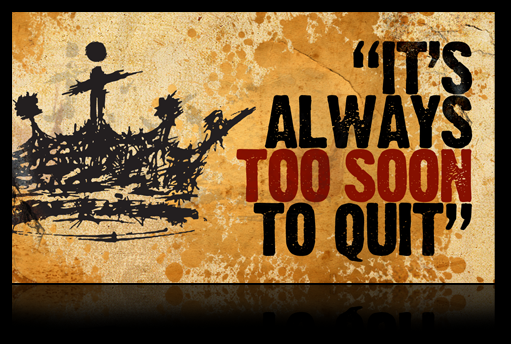Don’t Quit!
Several years ago, a Vietnamese acquaintance invited Song Yi and me (and Joseph) to her apartment. I don’t recall what we’d been given to expect, but we were a little surprised to find her living room filled with a dozen or more people sitting cross-legged on the floor and repeatedly chanting an incantation that sounded something like this.
We stayed (the alternative would have been more than rude), and as I spent the next half-hour or more awash in incomprehensible sounds I thought about the intentions of the lady who’d invited us. She’d wanted only to offer what she viewed as a blessing that might change our lives.
Later, a friend explained that this kind of chanting is intended to keep the demons at bay and to bring about happiness. He knew people who had chanted and then experienced good luck and who concluded that there must have been a connection between the two. Maybe more chanting would bring more good luck. Conversely, giving up on the chanting would put everything at risk.
I have no trouble seeing potential for a therapeutic benefit in sounds like this, particularly in terms of reducing agitation and internal chatter. On the other hand, that effect might be achieved simply via music. I don’t mean to tread on anyone’s beliefs, but expecting more than that amounts to what is called magical thinking. Seems to me.
Magical thinking is what leads us to do something that’s imbued with significance in our own mind, and hoping that that improves the odds for something else to come to pass, when there’s no objective reason to draw a connection between the two.
If you think chanting is pretty far out, another scenario might be easier to recognize. How about making an extraordinary sacrifice—spending a lot of money or traveling a great distance or enduring hardship—in the pursuit of some cherished goal? If, for example, the goal is finding help for a child who has major problems, sacrifices like that might be part of what is required. However, the sacrifices themselves aren’t the thing that addresses the problem. Putting the child in front of the right specialist can help (assuming there is a specialist). The other stuff is incidental. Making extreme sacrifices in order to do the wrong thing may impart a feeling that you have accomplished something, when really you have only hurt yourself.
This kind of thinking is attractive when we feel that we have no control over events. It’s natural to want to be in control. But what is the correct response when we aren’t?
This is pretty basic stuff, because all of us know what it’s like when things don’t go the way we want.
I began mulling over this last week, after reading an article (about the Middle East) in which the writer suggested that “there are problems for which solutions might not exist.”
Whether solutions exist or not, it’s absolutely true that there will always be problems for which we have no obvious answers.
So trouble is inevitable. However—and here I should give credit to a wise man named Bob Botsford—misery is optional. What, after all, is the point of being miserable? What is accomplished by it? Yeah, we’ve got issues. We all do. And if we put one behind us, another one will rise up to take its place.
I found that to be the case during our family’s campaign to help our son Joseph. We waged a long, drawn-out battle so he could crawl on his hands and knees, and when that was a done deal we had another battle to get him to where he could walk. And when he took those first steps, we’d barely gotten started.
I began to preceive that some of the remaining challenges at that point did not seem to have solutions.
So, what do you do in that situation? Quit?
Bob has a lot to say on the subject, but I’m going to take some liberties and distill it down to two points:
- It’s always too soon to quit.
- There’s no justification for beating yourself up about not having gotten there yet.
My family’s story with Joseph has been doing whatever we could that made sense, and to stop doing things that no longer made sense—while endeavoring not to lose heart. I don’t know how it’s all going to shake out, but what other option is there? Is the following true, or not?
Weeping may endure for a night, but joy comes in the morning.
Psalm 30:5

